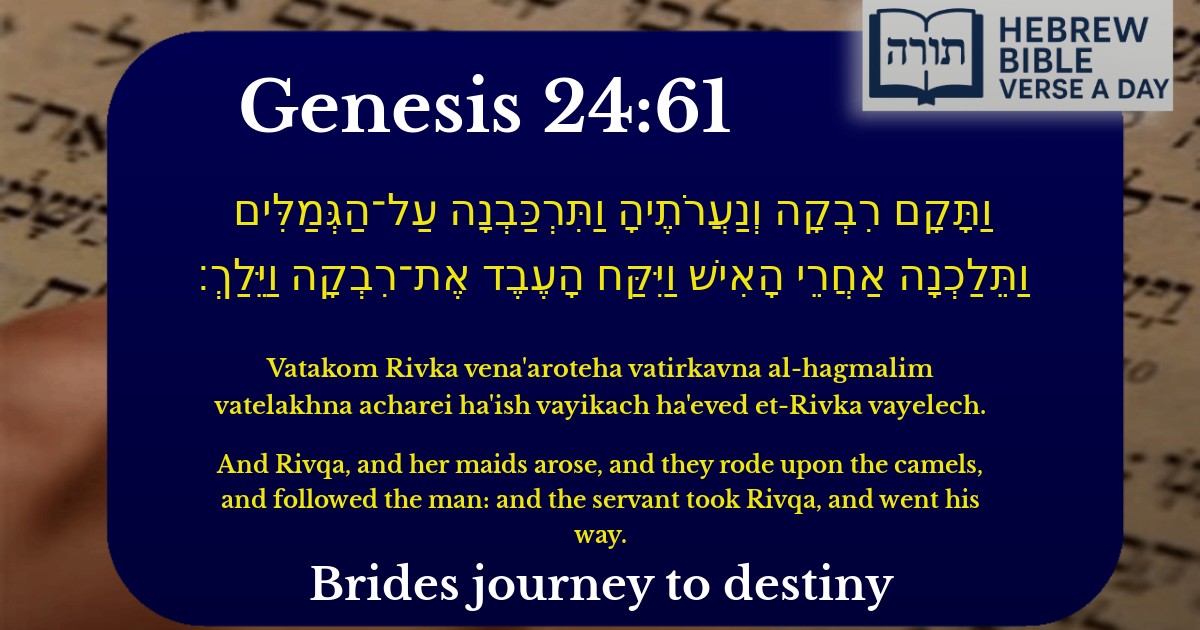Join Our Newsletter To Be Informed When New Videos Are Posted
Join the thousands of fellow Studends who rely on our videos to learn how to read the bible in Hebrew for free!
Hebrew Text
וַתָּקָם רִבְקָה וְנַעֲרֹתֶיהָ וַתִּרְכַּבְנָה עַל־הַגְּמַלִּים וַתֵּלַכְנָה אַחֲרֵי הָאִישׁ וַיִּקַּח הָעֶבֶד אֶת־רִבְקָה וַיֵּלַךְ׃
English Translation
And Rivqa, and her maids arose, and they rode upon the camels, and followed the man: and the servant took Rivqa, and went his way.
Transliteration
Vatakom Rivka vena'aroteha vatirkavna al-hagmalim vatelakhna acharei ha'ish vayikach ha'eved et-Rivka vayelech.
Hebrew Leining Text
וַתָּ֨קׇם רִבְקָ֜ה וְנַעֲרֹתֶ֗יהָ וַתִּרְכַּ֙בְנָה֙ עַל־הַגְּמַלִּ֔ים וַתֵּלַ֖כְנָה אַחֲרֵ֣י הָאִ֑ישׁ וַיִּקַּ֥ח הָעֶ֛בֶד אֶת־רִבְקָ֖ה וַיֵּלַֽךְ׃
וַתָּ֨קׇם רִבְקָ֜ה וְנַעֲרֹתֶ֗יהָ וַתִּרְכַּ֙בְנָה֙ עַל־הַגְּמַלִּ֔ים וַתֵּלַ֖כְנָה אַחֲרֵ֣י הָאִ֑ישׁ וַיִּקַּ֥ח הָעֶ֛בֶד אֶת־רִבְקָ֖ה וַיֵּלַֽךְ׃
🎵 Listen to leining
Parasha Commentary
📚 Talmud Citations
This verse is not quoted in the Talmud.


Rivqa's Immediate Departure
The verse describes Rivqa's swift action in leaving her family to accompany Avraham's servant to marry Yitzchak. Rashi (on Bereishit 24:58) notes that this demonstrates her righteousness, as she did not delay despite the emotional difficulty of leaving her home. The Midrash (Bereishit Rabbah 60:12) further emphasizes that her alacrity mirrored Avraham's when he fulfilled Hashem's command, showing her suitability to join the household of Avraham.
The Role of Rivqa's Maidservants
The mention of Rivqa's "na'aroteha" (her maidservants) is significant. Ramban (on Bereishit 24:59) explains that these were given to her by her family as part of her dowry, a common practice for noble brides. The Talmud (Yevamot 61b) notes that these maidservants later converted to Judaism, indicating that Rivqa's influence extended beyond herself.
Symbolism of the Camels
The camels ("hagmalim") carry symbolic meaning. The Kli Yakar (on Bereishit 24:61) observes that camels represent bearing burdens patiently, alluding to Rivqa's ability to endure the challenges of joining Yitzchak's household. Additionally, camels were associated with Avraham's wealth (as seen earlier in the parsha), subtly connecting Rivqa to Avraham's blessed legacy.
The Servant's Role
Walking "After the Man"
The phrase "vateilachna acharei ha'ish" (they followed the man) is interpreted by Sforno as demonstrating Rivqa's trust in Divine providence - she followed Eliezer (the servant) whom she recognized as being guided by Hashem's plan. This echoes the theme of hashgacha pratit that runs through the entire narrative of finding a wife for Yitzchak.